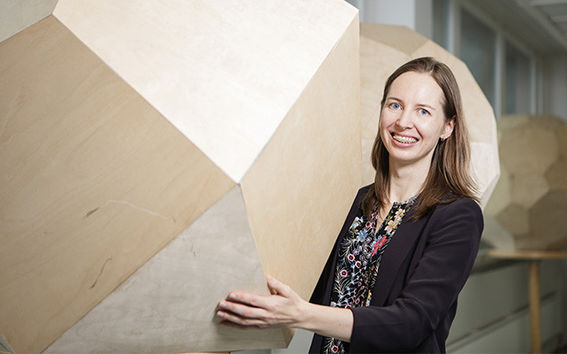Becoming a mathematician was a natural choice for Kaie Kubjas

Assistant Professor Kaie Kubjas, what kind of research do you do?
My main field of research is applied algebraic geometry with applications in statistics, optimization and phylogenetics. Algebraic geometry studies systems of polynomial equations and inequalities. In recent projects, I have applied algebraic geometry to low-rank tensor completion and maximum likelihood estimation for evolutionary models. Maximum likelihood estimation is an optimization problem and I am especially interested in finding the correct solution with a guarantee of correctness, which standard numerical methods usually cannot provide. Other important topics in my research have been nonnegative and positive semidefinite rank that appear in the context of statistics, machine learning and complexity theory.
How did you become a researcher?
I attended mathematics competitions as a child and already then I developed passion for solving problems. Later I wanted to solve mathematical problems that other people have not explained yet, and becoming a researcher was a very natural choice for me. I became very independent already as a PhD student, as my supervisor moved to another university after helping me to choose the key research topics in the beginning. As an Assistant Professor I am privileged to choose and study the scientific problems that I find most important.
What are the highlights of your career?
In 2014-2016, I was an independent postdoctoral researcher at Aalto Science Institute and studied similar subjects as I do now. In 2014, I spent a semester at the Simons Institute in Berkeley attending the program "Algorithms and Complexity in Algebraic Geometry". In 2013, I spent a semester at the Max Planck Institute for Mathematics in Bonn. I defended my PhD thesis "Algebraic and combinatorial aspects of group-based models" in May 2013 at the Free University of Berlin.
What is the most important quality for a researcher?
I think it is necessary to identify and keep the focus on the research problems that you find most relevant. Otherwise it is very easy to get distracted as there are so many research problems one could work on. Then it is a combination of hard work and good luck finding the solutions. When it comes to getting relaxed after work, I often go to a climbing gym. When I am climbing, I cannot think of anything else except the climbing route and let the math just go.
What do you expect from the future?
I am very excited to build my own research group. It is a completely new dimension for me. I also look forward to talking to people about different applications and identifying new problems where algebraic geometry can be helpful.
Read more news

The proxy server for remote access to e-resources is changing
If you have problems using e-resources, try accessing the e-resource using VPN connection.
A sustainable city is also age-friendly
Cities must involve older adults more strongly in the planning of the urban environment.
Renate Zhang’s journey in optimising the cost of creation
During the research program at Aalto University, Renate Zhang developed a cost-saving method that inspired her to pursue a doctoral degree.






